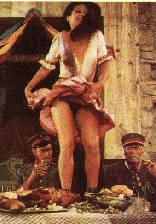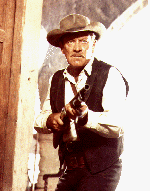
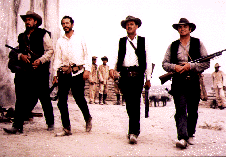 Warner Brothers (1969)
Warner Brothers (1969)A landmark film. An American Classic. A film that redifined cinematic violence. The Wild Bunch has been hailed as all of the above. Nearly thirty years after its intial release, the film has lost none of its impact. In fact, compared to today's action fare, it is even easier to appreciate this film that is as thought-provoking as it is exhilirating.
The story centers on an aging bunch of outlaws who are feeling increasingly
out of place as the days of the old West are coming to a close. Following a bungled robbery
attempt, the men flee to Mexico and soon become involved with a Mexican general who enlists
their aid in stealing a shipment of U.S. Army weapons. When the youngest member of the bunch is
caught stealing some of the guns in order to supply the revolutionaries in his home village,
he is taken captive and tortured by the General. The rest of the bunch decide to take a stand, despite
being hopelessly outnumbered, and heroically attempt to rescue their friend.

The outstanding cast features William Holden as Pike Bishop, the leader of the bunch. The other members are
portrayed by Warren Oates, Ben Johnson, Ernest Borginine, Jaime Sanchez, and Edmond O'Brien. All of the actors
are equally noteworthy in their own way. Holden as the contemplative leader, Borgnine as his long-time friend
and frequent voice of conscience, Oates and Johnson as the maniacal Gorch brothers, O'Brien as the geriatric
tag-along, and Sanchez as the naive and idealistic young member of the group. Other outstanding performances are turned
in by Robert Ryan as Holden's friend-turned-nemesis Deke Thornton, and Emilio Fernandez as the sleazy General Mapache.
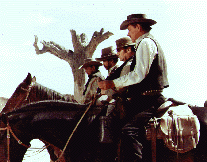
The screenplay by Peckinpah and Walon Green contains several moments of brilliance. My personal favorites are the exchanges beside a campfire between the leaders of the group (Holden and Borgnine) regarding the state of their affairs. Says Holden, "I'd like to make just one last big score and then back off." "Back off to what?" replies Borgnine, implying that their violent pasts wouldn't allow them to simply settle down peacefully at this point in their lives. I also particularly enjoy Holden's commentary on his hubris-filled nemesis Harrigan: "There's an awful lot of people who just can't admit to being wrong, or to learn from it." "Pride," answers Borgnine simply and shrugs his shoulders. Other central themes in the screenplay include honor, integrity, companionship, and in the end, redemption.
The Wild Bunch set the cinematic world on its ear by opening with a violent
shoot-out which could easily serve as an excellent finale to any film. The famous finale,
known as "The Battle of the Bloody Porch", is still the most powerful shoot-out ever filmed. As the saying
goes, this scene has often been imitated but never equaled.
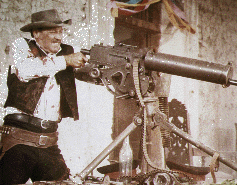
Technical credits are superb throughout. Lucien Ballard's cinematography coupled with the editing of Lou Lombardo create some classic results. The wardrobe supervised by Gordon Dawson does an excellent job of capturing the look and feel of the time. Jerry Fielding provides a beautiful score, as well.
The film has been critiqued and analyzed to great length by many film critics, historians, and fans like myself. If you haven't seen it, by all means do. If you haven't seen it recently, then you will no doubt be surprised by some of the scenes which were restored in the 1994 re-release. I should also add that this film should be viewed on the big screen if at all possible.
Powerful, elegaic, cathartic, absorbing, and unforgettable, The Wild Bunch is cinema at its best.
